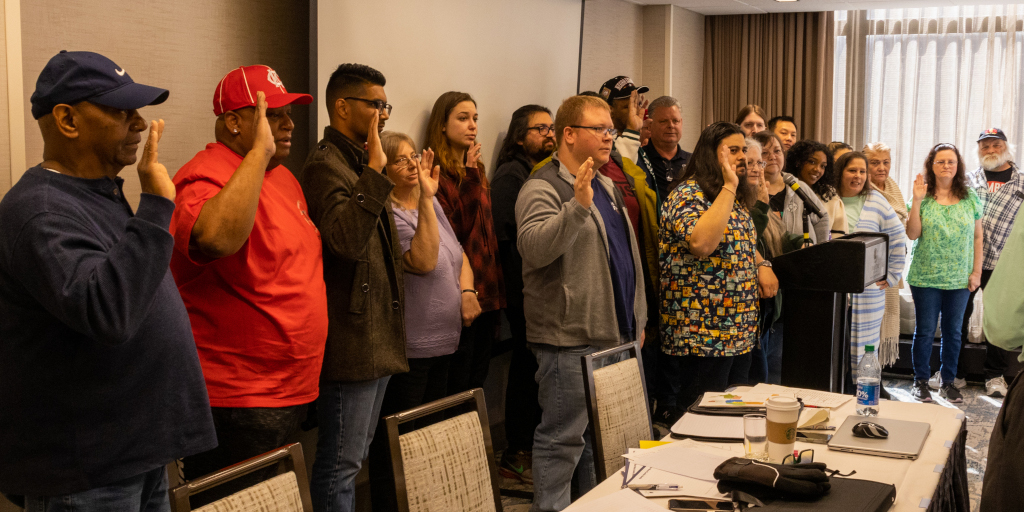
Member-run unions require democratic leadership. This means that leaders at all levels, from department steward to president, are elected, with frequent elections. It also means that, once elected, leaders conduct themselves in a democratic style, encouraging as much membership involvement and participation as possible.
Staff-run unions routinely appoint individuals to key positions on the basis of loyalty to top leadership. Members may feel powerless if their leaders aren’t accountable to them. In contrast, election by the members gives a union leader moral authority when negotiating with management. When a leader can say, “The members elected me to represent them,” his or her position carries more weight with management and with political and community leaders.
In member-run unions, every member is included in the governance of the union. Every member has the right to a copy of the union’s national, district and local constitutions as well as the collective bargaining agreement. Every member has access to the elected leadership via phone or email, or through personal conversations with local leaders at regular local meetings and with regional and national leaders at frequently scheduled regional meetings and national conventions.
Leaders in a member-run union derive their authority from being elected to represent the members as a whole. Once elected, they have a responsibility to lead — to listen to the whole membership, develop a program that represents a realistic way to achieve the members’ goals, and keep the members united behind that program. Simply deferring to the loudest voices in the room, even when they label themselves as the “rank and file,” is neither leadership nor democratic, because it robs the membership as a whole from being able to set the direction of the union, and because it often leads to division.
Short terms of office
UE favors a short term of office. A shorter term means greater accountability and membership control. A leader elected under those conditions has greater moral authority to speak on behalf of the members. More frequent elections also mean more frequent contact between the officers and the members.
The constitution should include a recall provision. It’s sad but true that employers often attempt to “buy off” or co-opt union leaders. With frequent local elections, members can easily remove an ineffective or untrustworthy person. As added protection, the constitution should also provide for the recall of an officer or steward prior to their term of office expiring. This can be accomplished by a provision mandating that an election be held upon receipt of a petition signed by a majority of union members represented by that individual.
Regular meetings
Regular meetings, with every member afforded the opportunity to speak, are indispensable. Meetings help hold elected leaders accountable for actions taken since the last meeting. Up-to-date financial reports should be given and records made available for review by the members. Meetings provide a setting for discussions that are needed to make important collective decisions and develop plans for the future.
Membership responsibilities
Members’ rights are clearly defined in a member-run union. However, members also have important responsibilities. These include the responsibility to attend meetings, to take part in decision-making, and to demonstrate support for the leadership when it becomes necessary to fight — during a grievance, contract negotiations, or other struggles. Members should also take part in important political action activities and the difficult task of organizing the unorganized. For a member-run union to be effective, members must view it as more than an insurance policy into which they pay money and then passively receive service.
To have an effective organization, members need to attend meetings. Irregular schedules and shifts might require more informal meetings at lunch time, breaks or shift changes. Such a schedule, although difficult to follow, can be crucial in maintaining a truly democratic organization.
Members also have a responsibility to utilize the democratic mechanisms established by the union — discussion and debates at regular and special membership meetings, officer elections, and contract ratification votes — and to respect the democratic decisions made by their fellow members. Taking disagreements about union strategy, contract bargaining, etc. into public forums — especially after a democratic decision had been made — merely shows disunity and strengthens the hand of the boss.
Collective leadership
Two heads are better than one. While each elected officer may have specific responsibilities, collective decision-making (and collective effort) is a must. Employers like nothing better than to have discussions with a single officer or representative and then sit back and revel in the distrust and turmoil they have created. While circumstances may dictate that a discussion needs to take place between a union representative and management, it should be a firm rule that no union representative has the authority to negotiate privately. Any one-on-one discussions with management must be done with the prior knowledge and permission of the collective leadership. Additionally, to preserve the integrity of the democratic process, any settlement or agreement reached between the negotiating committee and management must have the final approval of the total leadership and, where appropriate, a vote of the members. This includes ratification of all contracts.
Developing new leaders
Top-down unions do not encourage their members to step up into leadership positions — because new leaders might challenge the existing top leadership!
Member-run unions, on the other hand, must constantly be seeking to develop the leadership capacity of as many members as possible. The more members are willing to step up, the stronger the union is.
Member-run unions should seek, at a minimum, to have a full executive board, elected trustees who audit the union’s finances on a regular basis, and a robust steward system, with at least one steward in every department. Asking a member who has shown interest in the union to become a steward, a local trustee, or an at-large executive board member can be a good introduction to union leadership.
Setting up committees is also a good way to help members develop their leadership skills. In addition to contract support committees to mobilize the membership during contract negotiations, UE locals have established committees to organize social events, raise funds for worthy causes, and engage in political action.

Getting involved in the union really took somebody believing in me and personally encouraging me. I didn’t really trust myself to be useful if I plugged in. And it really just took our president at the time talking to me one-on-one and saying, “I think you’d be really good at it. I think you should run for steward.” And I was like, okay, I’ll try. And then I went from steward to recording secretary to president.
—UE Local 255 President Toby Madrone, at 2024 UE Building Union Power workshop. UE Local 255 represents workers at Hunger Mountain Co-op in Montpelier, VT.
Structures of accountability
Member-run unions are built to keep leaders accountable to the members. For example:
The elected leadership can resolve grievances, but the membership at monthly meetings has the right to review any settlement.
The negotiating committee bargains the contract, but members vote to accept or reject the final proposal.
Elected officers may spend money necessary to conduct union business, but the members must be kept informed and vote on the monthly financial report, as well as major expenditures.
Reimbursement of funds spent must be for the actual amount (with some predefined limits, such as meals and mileage). All checks must be signed by two union officers. Expenses are not reimbursed without proper receipts.
In a top-down union, elected leaders might see these accountability measures as “restraints on their ability to lead the union.” In UE, leaders see these practices as a way to have their leadership role reaffirmed on a monthly basis — and that sends a strong message to the employer.

Every UE member should consider the ways they can step up as a leader in the union. Members should:
- Attend union meetings to stay updated on what their local leaders are doing (and keep them accountable!)
- Approach local leaders with any questions or concerns they have about the union or the workplace
- Volunteer for committees
- Consider running for office
UE local leaders should:
- Make sure the local holds regular membership meetings, and that those meetings are accessible to all members
- Hold special meetings when special situations come up, to involve the whole membership in figuring out how to respond
- Identify members who seem interested in the union and give them access to training and opportunities to participate
- Create committees to enlist members in helping to run the union
- Always be thinking about who can replace them